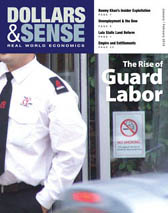This article is a web-only article from Dollars & Sense: Real World Economics, available at http://www.dollarsandsense.org

This is a web-only article.
Subscribe Now
at a 30% discount.
Comment
Economic Rights, Then and Now
January 11th, 2010 marks the 66th anniversary of FDR’s Economic Bill of Rights.
Economic security today? Yes. FDR’s January 11,1944 State of the Union Address unveiled a “Second Bill of Rights under which a new basis of security and prosperity can be established for all—regardless of station, race, or creed.” Roosevelt, citing “accepted, self-evident economic truths,” called economic security the “foundation of true individual freedom.” He continued, “equality in the pursuit of happiness” requires the right to “a useful job” that “provide(s) adequate food and clothing and recreation,” “a decent home” and, “adequate protection from the economic fears of old age, sickness, accident, and unemployment.”
That was 66 years ago.
Today’s unemployment—nearly 30 million people when you include those working part-time and those so discouraged they’ve stopped looking—rivals that of the Great Depression. Record numbers of households—their earnings stuck at 1998 levels—are worried about food and clothing. Recreation? Forget it. And for the millions whose homes are foreclosed decent housing is a distant memory.
Is it possible that economic policy makers don’t understand the magnitude of the crisis facing Americans whose livelihoods depend on jobs? Don’t they care? Or does economic ideology so blind them that they can’t see what was so obvious to FDR? “ ‘Necessitous men are not free men.’ People who are hungry and out of a job are the stuff of which dictatorships are made.” We ignore this at our peril. Today, as in 1944, “the grave dangers of ‘rightist reaction’” threaten economic security and political freedom. With insight and prescience FDR warned that if we return to business-as-usual after we have “conquered our enemies on the battlefields abroad, we shall have yielded to the spirit of Fascism here at home.”
Insecurity breeds Fascism. Too many of us begin each day staring anxiety in the face. Only the richest Americans enjoy an acceptable measure of economic security. With security in their pockets and billions (of our tax dollars) in their bank bonuses, they leisurely contemplate which mansion to live in, how much to spend on designer clothing, where to sip champagne, and who to hire to wash their clothes and tend their intimate needs. While the rest of us—checkbooks empty and shelves bare—worry about meeting our basic human needs.
What policy levers must we pull today to ensure economic rights proposed in the 1940s?
According to the Center on Budget and Policy Priorities the states face combined budget gaps of around $350 billion for fiscal years 2010 and 2011. The states, unlike the federal government, cannot run deficits. Moreover, when states cut spending to balance their budgets, the ensuing job losses cause further declines in tax revenues, necessitating more spending cuts. Forcing the states to run balanced budgets in times of extreme economic duress creates a vicious cycle of rising unemployment, falling tax collections, job cuts and more unemployment.
The federal government is the only economic actor with both the resources and power to counter this downward spiral. Yes, this means deficit spending.
If the Federal government stepped in with the $350 billion needed to balance state budgets, the states could hire 15 million (or one-half of all the currently unemployed) at $25,000 per year.
The alternative is worse! If the federal government does not step in—does not provide state grants sufficient to prevent further spending cuts—the resulting unemployment will create the same federal deficit, but we’ll have nothing to show for it!
The arithmetic is simple, the logic straightforward, the policy direct. Only fiscal dinosaurs and rightwing class warriors don’t get it.
President Roosevelt knew that significant federal spending was the key to economic security.
Deficits be damned. Full speed ahead!
Did you find this article useful? Please consider supporting our work by donating or subscribing.
